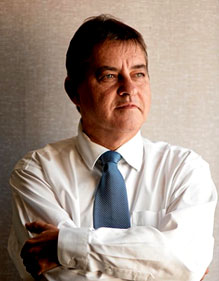|
Getting your Trinity Audio player ready...
|
 By Lee-Ann Alfreds
By Lee-Ann Alfreds
Richard Young is nothing if not dogged. For he has been like a dog with a bone in trying to shine a light on the goings-on in South Africa’s strategic defence procurement package, better known as the arms deal.
His efforts to get to the truth include successfully suing the government for millions; setting up a website which is described as a “virtual press office to follow the thread of certain questions being raised and investigations being undertaken into this controversial arms deal“; and supplying the compelling founding affidavit that anti-arms activist Terry Crawford-Browne used in his Constitutional Court bid which eventually led President Jacob Zuma to set up the Arms Procurement Commission, currently underway in Pretoria.
Now Young is set to appear before the commission – which is investigating allegations of fraud and corruption in the R71-billion, 1999 deal – even if he’s not properly prepared.
"If I had not put such an enormous amount of work, surely involving probably 2 000 man hours since the application to the Constitutional Court in 2009, I would be happier to let this go," says Young of his appearance on 4 March.
Young’s ambivalence over his appearance is not related to his conviction – which is unbending – that there was fraud and corruption in the deal, but rather to the way the commission has been run and to the fact that many of his requests for documents and other things have not been granted.
His first evidence leaders, advocates Barry Skinner and Carol Sibiya, resigned while they were busy preparing his witness statement (citing disrespectful treatment) and his new evidence leaders have not had the time to get up to speed. And his request for hundreds of documents has never been granted.
Determination to get to the truth
Still, the bulldog that is Young is not letting it deter him.
"I am happy with my new evidence leaders’ professionalism and the fact that they've been able to meet with me four times since late November, amounting to some eight or nine days in total.
"But I am very unhappy with the commission for only appointing them to be my evidence leaders in late November 2014 and for the sea change that the commission previously was going to prepare my witness statement, indeed insisted on doing so itself, yet my new evidence leaders insisted on me doing it myself.
"I have not only done that, but with the shortness of time I have also been forced to identify, furnish and cross-reference all the evidence documents that I'm going to use."
His issues with the commission notwithstanding, Young is confident that his appearance will not mimic those of other critics, many of whom have been savaged on the stand.
"I do not put myself in the category of any other witness, whistle-blowing or otherwise," insists Young, who says he wants to "turn into fiction" the fact that the commission has ruled that witnesses cannot rely on documents.
His bravado is less an issue of a massive ego than it is about his insider knowledge of the arms deal. Unlike the other critics, Young is an unsuccessful bidder who has first-hand experience of the deal, losing out on a contract worth hundreds of millions in suspicious circumstances.
His company, CCII Systems, was controversially dropped despite having been initially selected to supply the Information Management System for the German-built corvettes. In 2007, he won a R15-million payout for damages after taking the minister of defence, Armscor and others involved in the arms procurement process to court.
Because of the decision to drop CCII, Young has become an expert on the arms deal – expertise he is hoping will allow him to showcase the irregularities in the deal.
"I can still deliver a compelling case," says Young in an interview ahead of taking the stand. "Unfortunately, although I will tell the truth, it cannot be the whole truth if (commission chairman Judge Willie) Seriti continues with such unadulterated nonsense (which Geoff Budlender SC proved in the proceedings) re (critic and author Hennie) van Vuuren."
Van Vuuren and his co-author Paul Holden, and former ANC member Andrew Feinstein withdrew from the commission in August last year, citing Seriti’s ruling that witnesses could only rely on documents they had written and his refusal to admit into evidence crucial documents and declassify others among reasons for their decision.
Seriti’s rulings have validated Young’s fears at the outset of the commission that it was "merely an exercise for kicking into touch".
But proving his bulldog credentials, Young says that while "the commission and the greater public will be the poorer (because of Seriti’s conduct and rulings), I will ensure that I am the richer."






